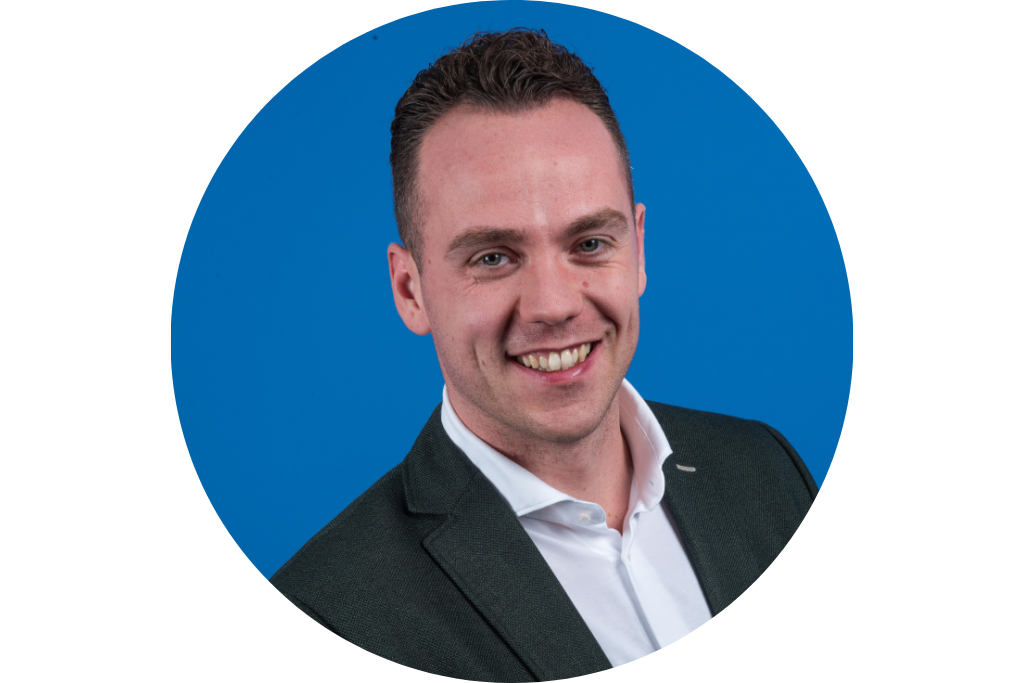
Associate professor Data, Crime & Security Science
‘Research should inform practice as objectively as possible’
Thom Snaphaan, associate professor at the Data, Crime & Security Science research group
The public debate on the fight against organised crime is too often driven by emotion and assumptions, says Thom Snaphaan. Appointed as associate professor at Data, Crime & Security Science on 1 March 2024, he sees it as his mission to do change that. “Science has an important responsibility to prevent unsubstantiated figures or ‘facts’ from taking on a life of their own. By conducting quantitative and empirical research on crime and security, I aim to provide our professional practice with reliable information. But I also want to translate that knowledge into concrete solutions. Just writing a research report doesn’t satisfy me.”
Now that he’s joined the Centre of Expertise for a Safe & Resilient Society at Avans, Snaphaan is back where his academic career began: he graduated from the Applied Safety & Security Studies programme here in 2013. He then obtained a Master’s degree in Safety Sciences from the University of Antwerp, followed by a PhD from the University of Ghent. “This is where I discovered that my heart really lies in research. It’s also where I developed my fascination with criminology – an important field.”
From conclusion to solution
But fundamental research alone left him feeling unsatisfied, as he wanted to contribute more than just a report or publication. “For a university, that’s usually the final product. But for the people who are going to apply your results, it’s only the beginning. As someone with a vocational background, I’m still practical-minded. I want to make sure my conclusions lead to solutions.” As part of a joint innovation team of the National Public Prosecutor’s Office for Financial, Economic and Environmental Offences and the Fiscal Information and Investigation Service (FIOD) in Amsterdam, Snaphaan was closer to practice. He delved further into data-driven strategies to combat organised crime and, together with Manon Kostense and Teun van Ruitenburg (now his colleague at the Centre), wrote a book on financial crime scripting, a method for identifying the financial steps in a criminal ‘business process’ as well as appropriate interventions.
More independence
His appointment as associate professor at Avans brings together all the things that drive Snaphaan. “I started here in 2023 as a senior researcher, which was a new role at the time. I didn’t know exactly what I’d be doing yet, but the vision and energy here were very inspiring. The role of associate professor is also new at this centre of expertise – it’s very cool to build something together,” he says. “Here at the Centre, I can work independently as a researcher because we’re part of a knowledge institution that’s separate from the organisations we partner with. In addition to project funding, we receive grants from funding bodies, allowing us to put certain issues on the agenda. We use our scientific methods to reduce crime, limit harm to society and increase security in practice.”
Common crime
Snaphaan’s research will mainly focus on two areas: organised crime and common crime. “There’s a lot of momentum behind the fight against organised crime in the Netherlands at the moment, but I think it’s also important to investigate common forms of petty crime. People tend to be more directly affected by things like online theft, burglary and aggression, so we need to keep paying attention to that type of crime as well. Most of the work of our field partners, such as the police, falls into this category.”
By harnessing and combining new and emerging big data, Snaphaan explains, we can learn a lot about the causes of common crime, and how to prevent and tackle it. “The proper collection and interpretation of this data is becoming even more important with the rise of AI. In my PhD research at Ghent University, I concluded that the use of big data and AI can be hugely beneficial for crime prevention and security, provided we use them responsibly. Because these models are made ‘smart’ by historical data, it’s extremely important that the quality of this data is undisputed.”
Crime scripting
Snaphaan will work closely with the Centre’s other research groups. “Our strength lies in our ability to combine disciplines and research methods, which is why I plan to translate the broader focus areas of the research groups into joint research projects.” His own focus is on crime scripting, an analytical method applied to the field of organised crime. “Together with the Organised Crime and Violence in Dependency Relationships research groups, I secured a grant of almost 2.5 million euros for a national research project called SCRIPT. This will allow us to scale up our research over the next five years. And we’ve already established a national network, as I’m currently editing a collection on this subject with contributions from 55 authors. It’s great to see everything coming together now.”
Organised crime
Snaphaan is also an advocate for the meaningful and responsible use of data and methods in research on organised crime. “Take the Underworld Map presented by RTL Nieuws in 2022 – a map that compares municipalities based on their vulnerability to organised crime. But the data and methodology used left room for criticism. A publication like that provokes a strong public reaction, and even the Minister of Justice and Security weighed in on it.” In a column on the website of the Netherlands Institute for the Study of Crime and Law Enforcement, Teun van Ruitenburg (professor of Organised Crime) and Snaphaan outlined the shortcomings of the map’s methodological design. “It’s crucial to be very specific in your definition of what you’re looking at, and to be careful in the conclusions you draw. As a researcher, I feel it’s my responsibility to help monitor scientific rigour.”

